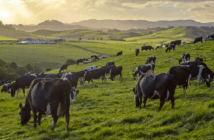HotSource July – sponsored by…
By Professor Richard Newcomb, chief scientist at Plant & Food Research
As global consumers continue to seek diverse protein offerings, developing innovative plant-based foods will support the future of Aotearoa New Zealand’s economy. In addition to exporting animal proteins, we could become a niche provider of high-value plant-based ingredients and foods for export and domestic use.
Commodity plant protein ingredients like pea or soy protein are manufactured by competitors overseas at scales and economies we can’t achieve. Instead of competing with existing plant protein commodities, it makes sense to maximise our natural advantages, including our maritime temperate growing conditions to provide new plant protein options. Pasture crops are a surprising contender.
New Zealand farmers excel at producing pasture crops to feed livestock. However, these crops could also provide nutrition for people. Few plants have all the essential amino acids but pasture crops offer the full complement. Three pasture crops have significant potential – Lucerne (alfalfa), perennial ryegrass, and brassica rape.
Extracting high protein yields from leaves is difficult, which is why most plant-based protein ingredients are taken from seeds. Currently, New Zealand company Leaft Foods and scientists at Plant and Food Research are working on recovering proteins from pasture crops.
Excess protein in pasture beyond the nutritional needs of livestock is responsible for the nitrogen expelled in urine. A side-benefit of extracting protein from plants used in animal feed is a tool to balance the amount of protein consumed by livestock. This reduces the amount of nitrogen leaching in soils and waterways while still providing adequate nutrition for animals. Developing an industry extracting protein from pasture crops would simultaneously improve the impact of animal farming on the environment.
Proteins from plants could be used as primary ingredients in a wide range of formulated foods and beverages. If successful, developing pasture crops for protein foods could provide New Zealand the means to participate in a US $50 billion market – a good example of how New Zealand could diversify its future food production.
Professor Richard Newcomb is chief scientist at Plant & Food Research overseeing all aspects of science quality, strategic science, capability development, and collaboration across the institute. He is also an honorary professor of evolutionary biology at the University of Auckland.































































































